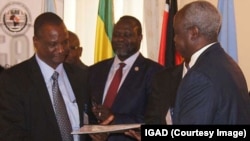South Sudan peace talks will be expanded to include a dozen more mediators, the East African bloc IGAD, which has been mediating the negotiations for 17 months, said Thursday.
The expanded talks, dubbed IGAD-Plus, will include representatives from the United States and its partners in the troika for South Sudan, Norway and the United Kingdom; the United Nations, China, five African states, the African Union, and the European Union.
IGAD-Plus will be formally launched at the African Union summit in Johannesburg, South Africa, which starts on Sunday. But the negotiations themselves are expected to take place in Addis Ababa, Ethiopia. A start date for the new round of talks has not yet been announced.
The five African nations that will be at the table are Algeria, Chad, Nigeria, Rwanda and South Africa. They will represent the five regions of the continent.
IGAD chief mediator, Ethiopia’s Seyoum Mesfin, said IGAD will continue to lead the negotiations.
IGAD proposed the expanded formula for the talks this week in Addis Ababa where negotiators for South Sudan's government, the main rebel group, and a group of former political detainees held three days of talks to try to relaunch the effort to end 18 months of fighting.
The lead negotiator for the government, Nhial Deng Nhial, said his side has "no problem with other countries being brought on board" but did not think that having more parties at the table "will add real value" to the negotiations.
But, Nhial added, the number of mediators at the talks "is not the issue. The issue is that the matters that are on the table for discussion should be dealt with more seriously than they are now."
Nhial said the talks' mediators have to get tougher with the rebels, and overrule some of their demands.
"For instance, the idea of the rebellion having their own army during the transitional period. I mean, these are issues that should be dismissed out of hand," he said.
The lead negotiator for Riek Machar's rebel group, Taban Deng Gai, said his side has "accepted fully, whole-heartedly the new mechanism, and we are ready to continue negotiating."
The fighting in South Sudan has forced two million people from their homes, pushed the young nation to the edge of famine and, with much of the fighting based in the oil-producing states of Unity and Upper Nile, crippled the oil-dependent economy.
The last round of peace talks for South Sudan ended without an agreement in early March. Since then, fighting has picked up again in parts of the country.




